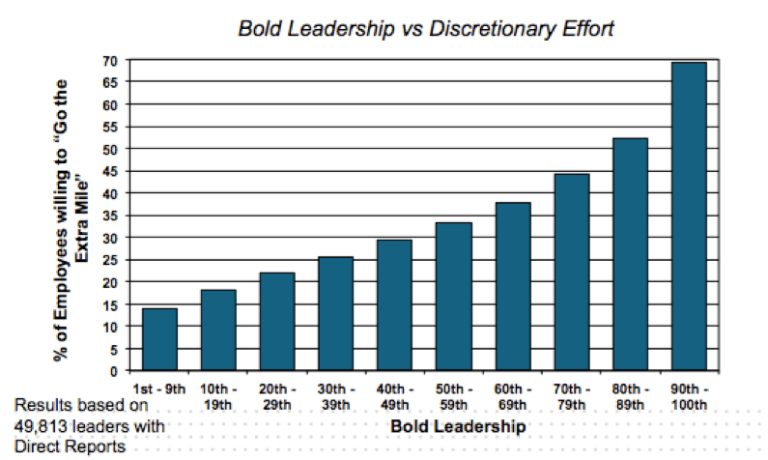When it comes to talent management, one key element is not just who you hire, but how you manage them. Management style often dictates how long those great new hires will stick around and what they’ll say when they leave. Yet according to Gallup research, 82% of managers end up being the wrong hire for their roles. This disconnect between great hires and great managers can have a ripple effect across a team or company, especially since a manager’s role in many organizations is to set the pacing around the work — and help motivate the people to see the long-term purpose in the work, beyond simply the paycheck. With so much at stake, it stands to reason that we need more effective managers in organizations. But how do we get them?
What’s the difference between a manager and a leader?
These terms are sometimes used as synonyms, but they are not. Broadly speaking, a manager is a person vetted by an organization to have a higher salary and direct reports underneath them in a corporate chart. A leader, on the other hand, may not have any direct reports or even be a manager, but they’re likely someone people respect, want to listen to, and follow the actions and instructions of. Not all managers are leaders, and not all leaders are managers. That’s a degree of nuance, but important to keep in mind. As is the fact that you can have a great manager who may never want to lead beyond their own team.
Read more: Want to be a great leader? Here are a few tips to get you started.
Why should you care about being a good manager?
It makes your organization more effective, plain and simple. Managers touch a lot of aspects of employee life from daily tasks, to project management, to performance reviews, and so on. When your manager is a resource to their team, employee loyalty skyrockets. But when they aren’t, you can imagine the impact. Most employees tend to leave their manager as opposed to their job (we’ve known this for years). So bad managers can tank retention numbers, engagement numbers, and overall financials of the business. Plus managers have the ability to shape a person’s entire day, which in turn has the potential to shape the day of that employee’s spouse, children, dog, random interactions at Starbucks, etc. If a manager says one off-hand thing to an employee during work, that manager can create an ecosystem of people feeling bad about their day and who wants to sign up for that? Employees caught in that negative trap will quickly move on to a better position, driving up turnover and destabilizing the teams they were a part of. The cost of bad management is high but don’t worry, there are tactics you can try to turn the story around.
Pro-tip: Check out this coaching cheat sheet designed for managers
10 tips to improve your management style
-
Management is about building something great together: This idea comes from Mark Leslie, who took a company with 12 employees and $95K in revenue and made it a company with 6,000 employees and $1.5 billion in revenue. In short, he’s someone to listen to. His basic advice is simple: invest others in your process. If everything is coming from a top-down vacuum, there will never be any real buy-in. In short: if you want to build trust, you need to demonstrate trust. Good managers find a way to get their team to see and believe in the big picture, rather than just their daily work.
-
To be a better manager, “fire yourself.” Not literally. But sit down every quarter with your team and talk about what everyone did wrong — believe us, everyone did something wrong — and “fire” yourself for that. Then come up with an action plan to prevent it from happening in the next quarter. Firing yourself is a strategy akin to just openly discussing failure at work. Everybody fails, and oftentimes more than once per hour. We need to discuss and re-contextualize that more, so that people can grow without fear of repercussion for honest mistakes.
-
Tell others what you’re struggling with. There is sometimes an attitude that big, important decisions can only come from higher levels of an organization, which makes no sense. An organization exists to make money typically, right? They part with some of that money — which they would rather have — in order to pay salaries to staff. If they’re parting with a key resource, shouldn’t the recipient of that resource (the staff) be allowed to contribute ideas and feel like they’re a part of it? If you lead a team, sit down every month and explain your biggest problem — i.e. what your boss is on you for. See what ideas they come up with.
-
Management is about creating an environment where your employees want to go the extra mile: Zenger-Folkman calls this “bold leadership,” which is a little bit buzzword-heavy (see above). In reality, you want your employees to want to work hard for you, which is represented in this chart by Zenger-Folkman:

-
Management is about listening: Richard Branson has made this a priority. When you take the time to check in and listen to your team you might hear some new ideas or become aware of matters that need your attention. Without listening, you might miss important
-
Management is about being a doer, seeking new opinions, showing support, and solving problems: That’s from nobody less than McKinsey, which is a fairly trusted brand when it comes to leadership research. It’s a little buzzword-heavy, yes, but you can’t argue with the results. Successful managers are good collaborators and know they need others to solve problems and seek out counsel when needed.
-
Reduce the amount of decisions you make: This one comes from Reed Hastings and Netflix, who have done pretty well the last few years. Think about tech CEOs wearing the same clothes every day (Jobs, Zuck, etc.) This happens in part because they want to reduce their decision-making energy in order to spend time on the biggest decisions they need to face down every day.
-
Invest in the training of others: Here’s an incredible stat on how we train leaders. Most leaders get their first leadership position at 30, and receive their first leadership training at 42. There’s over a decade in between those averages. So, the first 12 years you’re a leader of other people, you’ve probably been to no official trainings? That needs to be reconsidered. Good managers know their team will change and grow over time. Instead of running from that fact, embrace it. Invest in training programs to help your direct reports get to where they need to be and watch how your employee engagement and job satisfaction levels increase.
-
Management is about respect: Hard to sugarcoat this one. There’s evidence here, here, here, and here. Oftentimes, people become ‘managers’ — not the same as ‘leaders,’ yes — because of their skill around making money or hitting specific targets. They assume the next step of their career arc involves making others do what they just did. That’s where a lot of companies collapse people-wise: management and leadership are not intuitive. It’s about developing new skills in your people and respecting them.
-
Communication above all: We saved the most important for last. When people complain about their jobs and/or their managers, it’s very often in the context of how they don’t communicate. When you don’t communicate well, projects often collapse, people become disengaged, and the left-hand doesn’t know what the right hand is doing. That’s a big challenge for organizations. Communication needs to be the No. 1 skill that managers practice consistently.
Stay on track
Successful management all comes down to communication, recognizing achievements of employees, building trust, and creating a positive environment — something Google’s Project Aristotle deemed “psychological safety.” If you can consistently do those things, which admittedly is very hard for many managers, you will be a great manager. If you’re consistently willing to work on those things, you are on your way to being a great manager, which is going to mean better retention, better engagement, more knowledge staying in-house, and better financial returns. Working on self-improvement is never a quick or simple task but for managers who truly care about their team members, it’s a necessity for the workplace. Managers and team members alike can benefit from self-development assessments and program plans to help propel their learning over the course of their careers. Great managers aren’t born, they’re made and when you have the right tools on hand, you can make sure all your managers are set up for success.
{{cta(‘ffc283fc-3755-48e9-a286-6e2119517b4f’)}}








